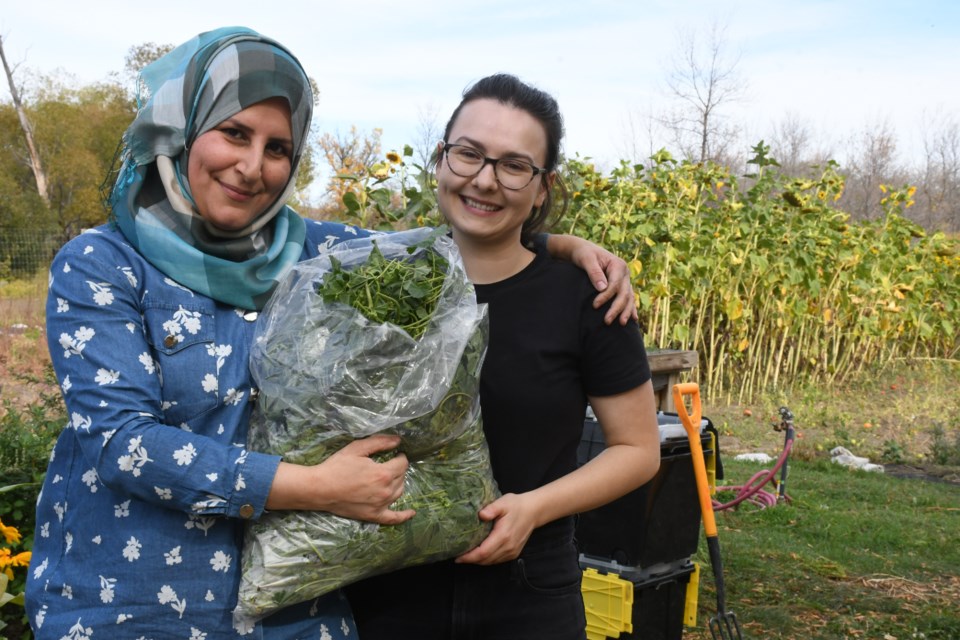MOOSEJAWTODAY.COM — Nearly a dozen students with the Moose Jaw Multicultural Council’s English language program dirtied their hands recently after helping Wakamow Valley Authority with its final harvest of the season.
The new immigrants spent the day at the Mosaic Community Food Farm picking carrots, potatoes, tomatoes and other vegetables that the authority (WVA) had laboriously grown since the spring.
WVA estimated that it harvested 8,600 pounds, although it expected that number to climb once it officially calculated everything. Last year, the final tally was roughly 15,000 pounds, which it distributed to several community charities.
WVA planned to close the farm for the season by Thanksgiving.
Hanan Tahlo is a Syrian refugee who lived in Turkey for a decade before moving to Moose Jaw roughly two years ago. She exuberantly expressed her affection for her new home and how great the community has been to her.
“People downtown have happy smiles; in Turkey, no happy,” Tahlo said during a break in harvesting. “Every day I like happy, school, learn English … (and my) teacher.”
Working in the garden was enjoyable since she liked harvesting vegetables such as parsley, mint, catnip, carrots and tomatoes. She also enjoyed picking squash leaves since she could cook them.
Moreover, she liked talking with her classmates, listening to some sing, and sharing her culture by providing a Syrian drink composed of milk, cinnamon, sugar and mastic.
“This is very, very relax(ing). This my people (and) every Canadian is friends,” Tahlo added.
The Multicultural Council has brought its classes to the food farm for several years to help plant, weed and harvest, explained Megan Jahnke-Stonehouse, a Language Instruction for Newcomers to Canada (LINC) teacher. This group started coming in the spring and returned every Wednesday.
It has been a great experience since the students love to help, while working in the garden can be a healing experience for many, she continued. Furthermore, it’s a great way to build community, become involved in Moose Jaw and connect with Canadians.
Jahnke-Stonehouse commended Allison Taylor, WVA’s food farm co-ordinator, for doing an “absolutely phenomenal job” in managing the garden. The teacher thought Taylor did well communicating what tasks were required, connecting the students with nature and allowing them to take home produce.
Laughing, Jahnke-Stonehouse added her hands and clothes were also dirtied harvesting because she helped students pick 500 pounds of tomatoes.
This was Taylor’s first year as the food farm co-ordinator and she thought the experience was awesome and fun because she created food and worked with numerous community groups. She also appreciated the support the WVA staff gave her.
Taylor has worked in the food industry for 10 years managing farms. She also spent three years working with the Mosaic Food Farm’s two previous gardeners. No matter the garden or its size, though, she is always learning something new.
“And especially with it being a new place for me — even though I spend a lot of time in the Wakamow Valley — it’s a totally different piece of land,” she said. “So, you’re really having to form a relationship with the land. And that takes time … . You have to work with nature, not against her.”
This spring was hot, so many cool-weather crops did poorly, while the summer was hot and dry, so much of what they planted later in the season caught up to everything else and did well, Taylor said, noting harvested started in July.
Also, the fall was warm, which was beneficial; the first frost occurred two weeks before shutdown.
Grasshoppers at the cabbage, while some cucumbers and celery regrew because they were transplants. Meanwhile, many other crops flourished, including zucchini, chard, potatoes, squash and perennial crops.
“Every year is awesome. It’s great that we get to provide food for the community. And we couldn’t do this without members of the community helping out … ,” Taylor added. “We don’t grow things on the land; we grow things with the land. The land is the one that grows it; we just cultivate it.”
In response to some providers blocking access to Canadian news on their platforms, our website, MooseJawToday.com will continue to be your source for hyper-local Moose Jaw news. Bookmark MooseJawToday.com and sign up for our free online newsletter to read the latest local developments.




